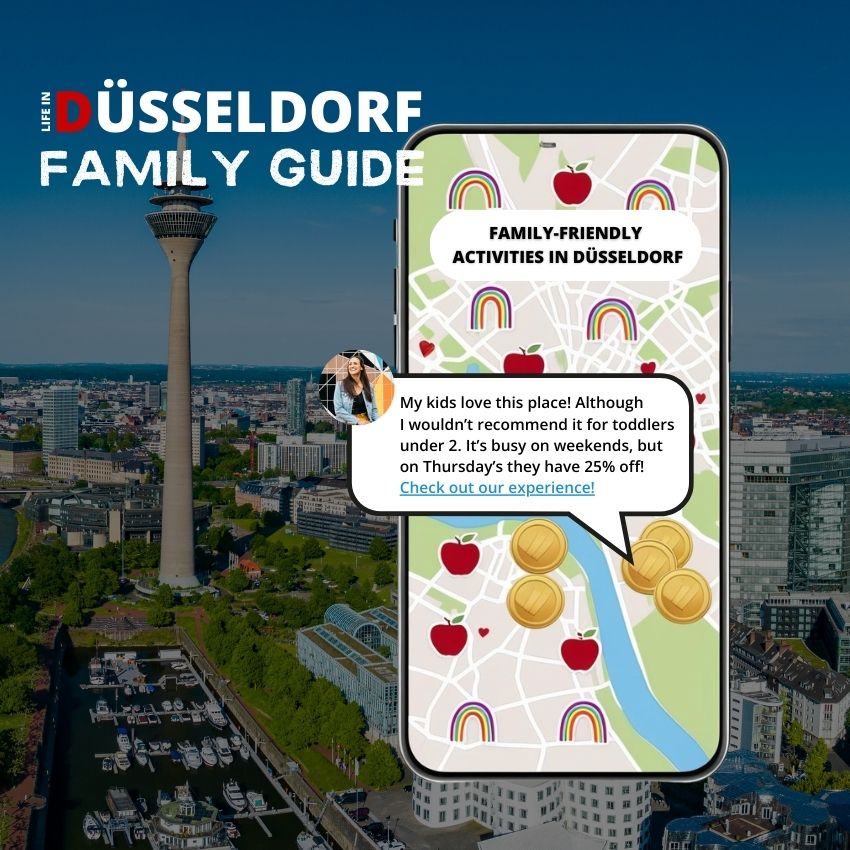Whether you’ve been in Germany for the last 10 years or the last 10-minutes, there’s no denying that learning German is hard. Could you imagine learning a new language like Chinese or Greek though?… Learning German is not impossible! However, Suzanne Beitling, Former Director of Studies at New Horizons English in Düsseldorf, is here to help you justify why perhaps you haven’t quite exactly figured out how to master the German language.
When I first moved to Germany, I thought learning German would be easy. I had already lived in Spain and learned Spanish, so I didn’t think it would be an issue. But I was very wrong!
According to the ExpatInfoDesk, HSBC Expat Explorer, and Commisceo Global, expats consistently face problems in communication.
Need advice on the best language schools in the city? We’ve got a full guide on Life in Düsseldorf! Otherwise, we’d also suggest downloading some fun apps on your phone to continue learning German – we’ve got a huge list of some of the best ways to learn German online, so start learning!
If you also face this issue and want to learn a new language, here are some things you should consider.
Your Experience
You have no control over how many languages you speak, how long ago you studied, the differences between your native language and the one you want to learn, or the way your brain is physically built. If you want to understand more about how these things affect your learning, please read on. If you want to skip right to some things you can control and change, please see ‘Environment’ and ‘Time on Task’ below.
How many languages do you speak?
Learning another language might be easier for you if you speak another foreign language already. When you learn a foreign language, it’s not all in your head — your brain is actually physically different. As you learn, the neurons (cells in your brain) build new pathways. People who have already learned one language can learn another more quickly because they have a previous path to follow.
On the other hand, speaking a foreign language already may actually make it harder for you to learn another language. There is often a feeling of ‘mixing’ or ‘losing’ a language as you begin to study another one. This is called ‘L2 and L3 Language Transfer,’ and no one agrees on it yet. It could mean that bilinguals make more mistakes as they learn, which in turn could mean that it takes them a bit longer to sort it all out. This, however, is all quite new research.
How long ago did you study? Use It or Lose It
Memory plays an important role in all learning. It makes sense that a person who has studied continually for the past 2 years has an easier time than a person who studied for a while but stopped using it for ten years. But why?
Short-term memory and long-term memory are different structures within the brain. As you learn, you must remember, revise, interact with, or connect the information to other concepts in your brain. This strengthens your neural network and makes language easily accessible. If you don’t use the network, the connections that were once formed are slowly replaced with information that you use more often, so you lose your skill.
But don’t worry! Have you spent a lot of time interacting with a different foreign language? If yes, you may have developed specialized structures in your brain to deal with multiple languages. This makes it easier for you to develop and learn another language or re-learn one that you have forgotten.
How different is your native language to the foreign language?
If your native language has a similar writing system, sound system, or vocabulary and grammar, then it may be much easier for you to learn the foreign language. If there are many differences, then it may take more time for you to learn.
What does your brain look like?
Additionally, perhaps because of the way your brain has developed due to all of these experiences or perhaps because of the way you were born, studies show that the way your brain is built can be a big indicator of whether or not you will learn quickly.
What can I do about it?
Unfortunately, you can’t change your prior experiences with language or learning. The good news is that you can influence the other two parts of the equation (Environment + Time on Task) to make language learning easier for you.
Environment
Macro environment: What is the language of the country that you live in?
It may seem obvious, but the language spoken by the rest of the country does not automatically mean that it will be easy for you to learn. While being immersed in the majority language can be helpful because it provides you more opportunities for practice, simply visiting or living there does not guarantee quick or easy language acquisition. There are other important factors too.
Microenvironment: What is the language you use at work, school, or home?
How much do you use the language in your daily life? Just reading an article a day compared to negotiating contracts or attending seminars makes a difference. Linguists agree that children who spend 30% – 50% of the day interacting with a language eventually acquire the language as a native speaker might. (That means in a 12 hour day, 4-6 hours should be in the foreign language!)
The good news is that you are probably not a child, and you are probably learning your second, third, or fourth language. That means you can use some strategies from your native language to boost your performance in the foreign language (this is called ‘Language Transfer’). You have some control over both your macro and microenvironment and you can change them to meet your learning goals. But the most control that you have is the last part of the equation.
Time on Task
The third part of the equation (and the one you likely have the most control over) is how much time you can spend engaged in the task. There are a few things for you to consider, including the difference between studying and learning, consistency of practice times, and interaction with the language.
Studying vs. Learning
There is a big difference between studying and learning. When you study, you put as much information as possible into your short-term memory so you can remember it just long enough for the test – and then forget about it. When you learn, you practice something over a long period of time, make a lot of mistakes, learn from those mistakes, and try it again. Is your goal to pass a test in the short term or really be able to use a language in the long term?
Consistency is Key
You don’t expect a plant to grow when you give it one liter of water on the first day of the month and nothing the rest of the month. Language is the same. It needs regular practice. (Remember that children need 4-6 hours per day to become bilingual!)
When it comes to languages, both brain memory (see above ‘How long ago did you study?’) and also muscle memory plays a role.
Think about it: does a sports player make a decision to raise her arm, swing it back, release her fingers to make a throw?
Of course not. In the same way, speakers of a language do not think about the placement of their tongues against their teeth or palate, or whether to vibrate their vocal cords or not. This memory happens in your muscles and is acquired over time, with lots of trial and error.
Interaction
When you go to a typical traditional classroom, you sit and listen to a speaker who presents you with information. You may take notes to review later, and in good situations, you get to say the words or use the grammar form once or twice.
Using this method may allow you to remember the main parts of the information, assuming you were paying attention, but it does not mean that you will be able to reproduce it later on.
The more time you spend interacting with a language, the better your results will be. (If you need some ideas, a qualified language trainer or coach can help you with this.)
The experience is totally out of your control
Of the three main factors that influence language learning, the experience is totally out of your control, which can be difficult to admit.
While you may not be able to control your macro environment, you can often influence your microenvironment to your advantage by changing where you spend your time during the day (or finding a socially active group in the area). The last third of the equation, time on task, is the most controllable part. With the support of a qualified language coach, you may be able to make the most efficient use out of the time you spend on the task. By knowing more about the factors that influence the difficulties of language learning, you can set realistic expectations for real progress.
This article was written using a number of educational resources including the ones mentioned below: www.ncbi.nlm.nih.gov, www.observatoireplurilinguisme.eu, www.brainconnection.brainhq.com,
www.journals.cdrs.columbia.edu, www.files.eric.ed.gov, www.brainhq.com, www.sciencedirect.com, www.ncbi.nlm.nih.gov/pubmed/












